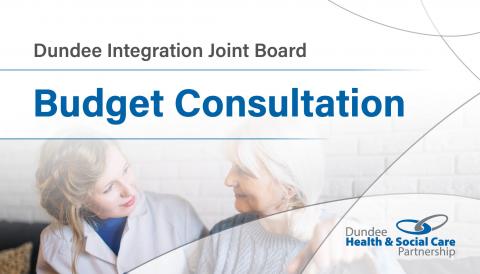
The IJB launched its first budget consultation on 14 February 2025, closing again 20 days later (5 March 2025). Regular promotion of the consultation was undertaken during this period to encourage feedback from a variety of stakeholders, including people who use health and social care services and supports, unpaid carers, members of the health and social care workforce and providers of health and social care services in the third and independent sector. There was a total of 560 responses.
The online survey was made available via Dundee Health and Social Care Partnership’s website and paper versions made available in libraries and from Claverhouse Social Work Centre with support available from staff if required. The average time taken to complete the survey online was 40 minutes. Most responses were made online; 3 paper versions of the online survey were received and input, with a further 5 detailed written responses received in relation to specific options outlined within section 4 of the survey.
Key findings from the budget consultation process were:
Respondents were asked about factors they felt should be given greatest priority by the IJB when it is making decisions about how available budgets should be allocated. Factors that respondents felt should be given greatest priority were meeting the needs of people who need services right now / are in crisis, helping people with the highest levels of need and, helping people to live independently in their own community. In relation to how services are delivered in the future, respondents felt greatest priority should be given to timely access, services being free to access and use and, services being provided in-person.
Respondents expressed most support for saving options to work with NHS Tayside to improve the use of digital technology across health and social care services and to work with Dundee City Council to maximise income from chargeable services. Least support was expressed for reducing flexibility in service budgets to respond to unexpected changes in demand and for reducing the amount of funding the IJB provides to the Third Sector. Respondents were most concerned that saving options would result in services not being available in crisis situations and on the number and length of delayed discharges.
Respondents were given the opportunity to provide information about the level and nature of negative impacts that individual saving options could have. They were asked to give an indication of the level of negative impact they expect the options would have on them (from no impact through to high impact – overall 4-point scale). Overall, the highest impact rating for individual respondents was given to reducing Third Sector Funding at 2.9, removing flexibility for unexpected demand 2.8 and reviewing Medicine for the Elderly and Palliative and End of Life Care and closing the Homeopathy Service both at 2.3 (all within the medium impact range). The lowest impact rating was given for reviewing the Community Meals Service and changing the model of service for Housing with Care both at 1.9 (low impact range). Overall, the highest impact rating for responses on behalf of an organisation was given to reducing Third Sector Funding at 3.5 (high impact range), removing flexibility for unexpected demand 3.1 (high impact range) and reviewing Medicine for the Elderly and Palliative and End of Life Care at 2.5 (medium impact range).
Many respondents took the opportunity to also provide further feedback on the potential impact of savings options (between 89 and 200 responses were received for each option). Overall, these responses focused on protecting those services which serve vulnerable people; many respondents mentioned the impact of the savings options on older people, disabled people and people who long-term health issues, including mental health issues and drug and alcohol use, and unpaid carers. Feedback also emphasised the impact in particular on those living in poverty in the city.
An analysis of average impact for specific groups has been completed, with a focus on equality and fairness groups. One instance of significant negative variation between the average impact score of a specific group and the average impact score for the whole sample of individual respondents was identified: the impact rating for people who consider themselves to have a religion or belief other than Christian, Church of Scotland or Roman Catholic (32 respondents) in relation to the option to close the Homeopathy Service for Tayside was 1 point higher (3.3) than that of the whole sample of individual respondents (2.3). It should also be noted that Black and Minority Ethnic Groups (43 respondents) rated impacts higher across all saving options; although these differences are not considered to be significant, taken together they demonstrate the need to consider impacts and mitigations for this group of people.
A full copy of the results from the budget consultation can be found here. Throughout the consultation period a range of helpful feedback was also received regarding the consultation process and survey tool; this will be used to inform planning of future budget consultations.
